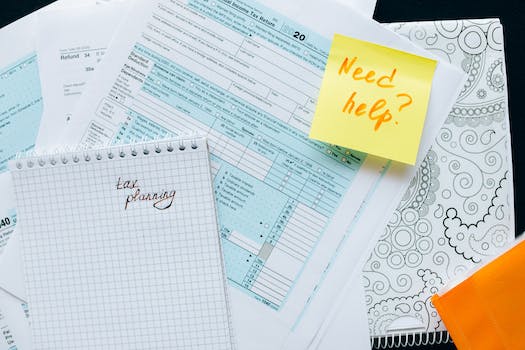-
Table of Contents
- Introduction
- How to Maximize Your Tax Refund: Strategies for Tax Planning
- How to Reduce Your Tax Liability: Tax Planning Tips for Small Business Owners
- Understanding Tax Deductions: What You Need to Know for Tax Planning
- Tax Planning Strategies for Retirement: How to Make the Most of Your Money
- Tax Planning for Self-Employed Individuals: Tips for Minimizing Your Tax Burden
- Conclusion
“Tax Planning Made Easy: Strategies for a Stress-Free Tax Season – Tips by nishankhatri.xyz”
Introduction
Tax planning is an important part of financial planning. It involves taking steps to reduce your tax liability and maximize your after-tax income. Tax planning can help you save money and reduce stress during tax season. In this article, we will discuss some tax planning strategies that can help you have a stress-free tax season. We will cover topics such as filing your taxes early, taking advantage of deductions and credits, and understanding the tax laws. With these tips, you can make sure that you are taking advantage of all the tax benefits available to you and minimize your tax liability.
How to Maximize Your Tax Refund: Strategies for Tax Planning

Tax season is here, and it’s time to start thinking about how to maximize your tax refund. With the right strategies, you can make sure you’re taking advantage of all the deductions and credits available to you. Here are some tips for tax planning that can help you get the most out of your refund.
1. Know Your Tax Bracket: Knowing your tax bracket is essential for tax planning. This will help you determine which deductions and credits you’re eligible for and how much you can save.
2. Take Advantage of Tax Credits: Tax credits are a great way to reduce your tax liability. There are a variety of credits available, such as the Earned Income Tax Credit, the Child Tax Credit, and the American Opportunity Tax Credit. Make sure you’re taking advantage of all the credits you’re eligible for.
3. Maximize Your Deductions: Deductions can help reduce your taxable income, which can result in a larger refund. Common deductions include charitable donations, medical expenses, and student loan interest. Make sure you’re taking advantage of all the deductions you’re eligible for.
4. File Early: Filing your taxes early can help you get your refund faster. It also reduces the risk of identity theft and errors on your return.
5. Use Tax Software: Tax software can help you maximize your deductions and credits, as well as ensure accuracy on your return.
By following these tips, you can make sure you’re taking advantage of all the deductions and credits available to you and maximize your tax refund. With the right strategies, you can make sure you’re getting the most out of your refund.
How to Reduce Your Tax Liability: Tax Planning Tips for Small Business Owners
As a small business owner, you know that taxes can be a major expense. But with the right tax planning strategies, you can reduce your tax liability and keep more of your hard-earned money. Here are some tips to help you get started.
1. Take Advantage of Tax Deductions: Make sure you’re taking advantage of all the deductions available to you. This includes deductions for business expenses, such as office supplies, travel, and meals. You may also be able to deduct certain business-related interest payments.
2. Invest in Retirement Accounts: Contributing to a retirement account can help reduce your taxable income. Consider setting up a SEP IRA or a Solo 401(k) to maximize your contributions and reduce your tax liability.
3. Utilize Tax Credits: Tax credits can help reduce your tax liability dollar-for-dollar. Look into credits for hiring employees, investing in energy-efficient equipment, and more.
4. Consider Incorporating: Incorporating your business can help you save on taxes. You may be able to take advantage of lower corporate tax rates and deductions for certain business expenses.
5. Keep Accurate Records: Accurate record-keeping is essential for any business. Make sure you’re keeping track of all your income and expenses so you can take advantage of all the deductions and credits available to you.
By following these tips, you can reduce your tax liability and keep more of your hard-earned money. With the right tax planning strategies, you can maximize your savings and ensure your business is running as efficiently as possible.
Understanding Tax Deductions: What You Need to Know for Tax Planning
Tax season is upon us, and it’s time to start thinking about tax deductions. Tax deductions can be a great way to reduce your taxable income and save money on your taxes. But understanding how deductions work can be confusing. Here’s what you need to know for tax planning.
First, it’s important to understand the difference between a deduction and a credit. A deduction reduces your taxable income, while a credit reduces your tax liability. For example, if you have a $10,000 deduction, your taxable income is reduced by $10,000. If you have a $10,000 credit, your tax liability is reduced by $10,000.
Second, there are two types of deductions: itemized deductions and standard deductions. Itemized deductions are deductions for specific expenses, such as mortgage interest, charitable contributions, and medical expenses. Standard deductions are a set amount that you can deduct from your taxable income. The amount of the standard deduction depends on your filing status.
Third, there are many deductions available to taxpayers. Some of the most common deductions include:
• Mortgage interest
• Charitable contributions
• Medical expenses
• State and local taxes
• Home office expenses
• Retirement contributions
• Education expenses
• Investment expenses
• Business expenses
Finally, it’s important to keep track of your deductions throughout the year. This will help you maximize your deductions when it comes time to file your taxes. You should also keep all of your receipts and other documentation in case you are audited.
Tax deductions can be a great way to reduce your taxable income and save money on your taxes. But understanding how deductions work can be confusing. By understanding the difference between deductions and credits, the types of deductions available, and how to keep track of your deductions, you can make the most of your tax planning.
Tax Planning Strategies for Retirement: How to Make the Most of Your Money
Retirement planning is an important part of financial planning. It is important to plan for retirement in order to ensure that you have enough money to live comfortably in your later years. There are a number of tax planning strategies that can help you make the most of your money during retirement.
1. Maximize Your Retirement Accounts: One of the best ways to save for retirement is to maximize your contributions to retirement accounts such as 401(k)s and IRAs. These accounts offer tax advantages that can help you save more money for retirement. Contributions to these accounts are tax-deductible, and the money grows tax-free until you withdraw it.
2. Take Advantage of Tax Credits: There are a number of tax credits available to retirees. These credits can help reduce your tax liability and increase your retirement savings. Examples of tax credits include the Retirement Savings Contributions Credit, the Saver’s Credit, and the Lifetime Learning Credit.
3. Consider Tax-Efficient Investments: When investing for retirement, it is important to consider the tax implications of your investments. Some investments, such as municipal bonds, are tax-free, while others, such as stocks, are taxed at a lower rate. Investing in tax-efficient investments can help you save more money for retirement.
4. Take Advantage of Tax-Deferred Accounts: Tax-deferred accounts, such as annuities and deferred annuities, allow you to defer taxes on your investments until you withdraw the money. This can help you save more money for retirement, as you will not have to pay taxes on the money until you withdraw it.
5. Consider Roth Accounts: Roth accounts, such as Roth IRAs, allow you to contribute after-tax money to an account that grows tax-free. This can be a great way to save for retirement, as you will not have to pay taxes on the money when you withdraw it.
By following these tax planning strategies, you can make the most of your money during retirement. It is important to plan for retirement in order to ensure that you have enough money to live comfortably in your later years.
Tax Planning for Self-Employed Individuals: Tips for Minimizing Your Tax Burden
As a self-employed individual, you are responsible for managing your own taxes. This can be a daunting task, but with the right strategies, you can minimize your tax burden and maximize your profits. Here are some tips to help you plan for taxes as a self-employed individual.
1. Track Your Expenses: Keeping accurate records of your business expenses is essential for tax planning. Make sure to track all of your business-related expenses, including office supplies, travel, and meals. This will help you maximize your deductions and reduce your taxable income.
2. Take Advantage of Tax Deductions: Self-employed individuals are eligible for a variety of tax deductions. These include deductions for home office expenses, health insurance premiums, and retirement contributions. Make sure to take advantage of all the deductions available to you to reduce your taxable income.
3. Make Estimated Tax Payments: Self-employed individuals are required to make estimated tax payments throughout the year. These payments are based on your estimated tax liability for the year. Making estimated tax payments can help you avoid penalties and interest charges.
4. Consider Incorporating: Incorporating your business can provide you with additional tax benefits. Incorporating can help you reduce your taxable income and provide you with additional deductions.
5. Hire a Professional: Tax planning can be complicated, so it’s a good idea to hire a professional to help you. A tax professional can help you maximize your deductions and ensure that you are taking advantage of all the tax benefits available to you.
By following these tips, you can minimize your tax burden and maximize your profits as a self-employed individual. With the right strategies, you can ensure that you are paying the least amount of taxes possible.
Conclusion
Tax planning is an important part of financial planning and can help reduce stress during tax season. By taking the time to understand the tax laws and regulations, as well as the various strategies available, individuals can make informed decisions that will help them save money and reduce their tax burden. Additionally, by taking advantage of deductions and credits, individuals can further reduce their tax liability. With the right strategies and planning, individuals can have a stress-free tax season.
















